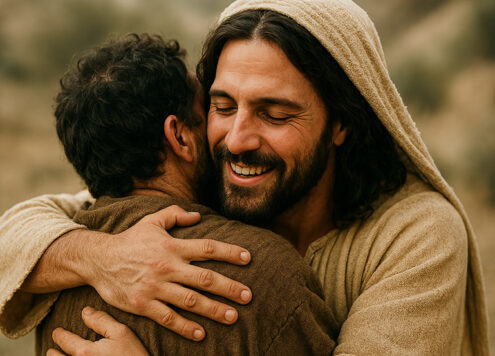The passion of Christ is celebrated every Palm Sunday, and has all the elements of a Greek tragedy, except it has more. It begins with Jesus’ joyful entry into Jerusalem as the long awaited Messiah with an enthusiastic crowd throwing palms along His route. Then it switches to tragedy, but it does not end in tragedy like a Greek drama. It ends in victory. It is recorded in all the gospels and is more than a record of one individual’s suffering. It is a process through which all who call themselves Christians must enter. That is why there is so much we can identify with in this Palm Sunday and Passion account of the life of Christ.
Generally, we tend to see ourselves in this story only as sympathetic bystanders. We are more than that! We are the judges, the betrayers, the cowardly disciples and the executioners. How often do we condemn others or betray their trust? How quickly are we ready to unleash a bitter tongue, a piercing remark, a snap judgment? How mercilessly do we find ourselves following the crowd, taking the easy way out, shirking our responsibility to follow Christ? We may not like thinking about such things, but we must, if we are to enter into the passion of Christ and cast off the old person and rise again to new life.
The sins of the judges, disciples and executioners, for whom Christ also died, were not just the past-sins of those who condemned Him over two thousand years ago. They are present-day sins which people commit daily. They are the sins of ordinary people today who turn on each other, who unleash a bitter tongue on those they dislike, who refuse to forgive and see Christ in their brothers and sisters.
We are invited in the passion story to identify with Christ on the cross. But doing so is not easy, for it means saying “yes” to demanding questions. Are we willing to be vulnerable, to forgive those who hate us? Can we choose to love rather than seek revenge? Can we strive for unity among Christians rather than division? Can we choose life over death? To identify with Christ on the cross is to follow him to the cross. It means to say “yes” to all these cross-bearing questions, to renounce the seductions and attachments to sin and to a world compromised by sin in order to be set free with the freedom of a child of God.
Every year, as we celebrate Palm Sunday and the passion of Christ we become part of the greatest drama that has ever unfolded on earth. We recall how a master became a servant, how he humbled himself and yet was exalted above every other creature, how death was swallowed up in life, how he gave us his word, his example, the new passover of the mass, the sacrament of His love at the last supper.
The passion of Christ in all four synoptic gospels is the story of Christ’s love for us. It is also the story of the new, non-bloody sacrifice which Christ celebrated with his disciples before His passion in the upper room, and which He bound His disciples to do in His memory ( Luke 22: 15-20 ).
Sacrifice and Love, all wrapped up in one, is Christ’s lasting gift to us.
Fr. Hugh Duffy











1 Comments
Lois Bradley
Thanks Father Duffy I enjoy the music and the links make me think what life herein earth is about.